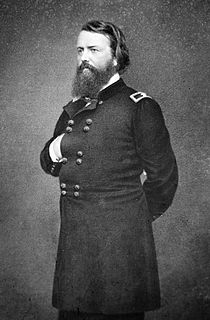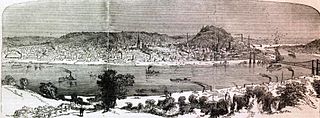
Joseph Hooker was a career United States Army officer, achieving the rank of major general in the Union Army during the American Civil War. Although he served throughout the war, usually with distinction, Hooker is best remembered for his stunning defeat by Confederate General Robert E. Lee at the Battle of Chancellorsville in 1863.
In the 1860s, the Copperheads, also known as Peace Democrats, were a faction of Democrats in the Northern United States of the Union who opposed the American Civil War and wanted an immediate peace settlement with the Confederates.

John Pope was a career United States Army officer and Union general in the American Civil War. He had a brief stint in the Western Theater, but he is best known for his defeat at the Second Battle of Bull Run in the East.
A number of cases were tried before the Supreme Court of the United States during the period of the American Civil War. These cases focused on wartime civil liberties, and the ability of the various branches of the government to alter them. The following cases were among the most significant.

George Walker Crawford was a licensed attorney turned politician from Columbia County, Georgia. Crawford was appointed attorney general for the state in 1827, by Governor John Forsyth, serving in that capacity until 1831. Crawford also served five years in the General Assembly's lower house as a representative of Richmond County on a platform of states' rights.

Clement Claiborne Clay, also known as C. C. Clay, Jr., was a United States Senator (Democrat) from the state of Alabama from 1853 to 1861, and a Confederate States Senator from Alabama from 1862 to 1864. His portrait appeared on the Confederate one-dollar note.
The Army of the Ohio was the name of two Union armies in the American Civil War. The first army became the Army of the Cumberland and the second army was created in 1863.
The Birchard Letter, was a public letter from United States President Abraham Lincoln to Matthew Birchard and eighteen other Ohio Democrats in which Lincoln defended the administration's treatment of antiwar agitators, and offered to release Clement Vallandigham if a majority of those to whom the letter was addressed would subscribe to three pledges in connection with the prosecution of the American Civil War.

During the American Civil War, the State of Ohio played a key role in providing troops, military officers, and supplies to the Union army. Due to its central location in the Northern United States and burgeoning population, Ohio was both politically and logistically important to the war effort. Despite the state's boasting a number of very powerful Republican politicians, it was divided politically. Portions of Southern Ohio followed the Peace Democrats and openly opposed President Abraham Lincoln's policies. Ohio played an important part in the Underground Railroad prior to the war, and remained a haven for escaped and runaway slaves during the war years.
Popular opposition to the American Civil War, which lasted from 1861 to 1865, was widespread. Although there had been many attempts at compromise prior to the outbreak of war, there were those who felt it could still be ended peacefully or did not believe it should have occurred in the first place. Opposition took the form of both those in the North who believed the South had the right to be independent and those in the South who wanted neither war nor a Union advance into the newly declared Confederate States of America.

Alexander Long was a Democratic United States Congressman who served in Congress from March 4, 1863 to March 3, 1865. During the Civil War, Long was a prominent "Copperhead", a member of the peace movement of the Democratic Party, and he was identified as being one of the war's most vehement opponents. Even though Long was a "free-soiler" Democrat who in his early years voted to repeal the "Black Laws of Ohio", he later opposed both emancipation and suffrage for blacks.
Habeas corpus is a recourse in law challenging the reasons or conditions of a person's confinement under color of law. A petition for habeas corpus is filed with a court that has jurisdiction over the custodian, and if granted, a writ is issued directing the custodian to bring the confined person before the court for examination into those reasons or conditions. The Suspension Clause of the United States Constitution specifically included the English common law procedure in Article One, Section 9, clause 2, which demands that "The privilege of the writ of habeas corpus shall not be suspended, unless when in cases of rebellion or invasion the public safety may require it."

The Knoxville Campaign was a series of American Civil War battles and maneuvers in East Tennessee during the fall of 1863 designed to secure control of the city of Knoxville and with it the railroad that linked the Confederacy east and west. Union Army forces under Maj. Gen. Ambrose Burnside occupied Knoxville, Tennessee, and Confederate States Army forces under Lt. Gen. James Longstreet were detached from Gen. Braxton Bragg's Army of Tennessee at Chattanooga to prevent Burnside's reinforcement of the besieged Federal forces there. Ultimately, Longstreet's own siege of Knoxville ended when Union Maj. Gen. William Tecumseh Sherman led elements of the Army of the Tennessee and other troops to Burnside's relief after Union troops had broken the Confederate siege of Chattanooga. Although Longstreet was one of Gen. Robert E. Lee's best corps commanders in the East in the Army of Northern Virginia, he was unsuccessful in his role as an independent commander in the West and accomplished little in the Knoxville Campaign.

During the American Civil War, the Ohio River port city of Cincinnati, Ohio, played a key role as a major source of supplies and troops for the Union Army. It also served as the headquarters for much of the war for the Department of the Ohio, which was charged with the defense of the region, as well as directing the army's offensives into Kentucky and Tennessee.

The court-martial of Fitz John Porter was a major event of the American Civil War. Major General Fitz John Porter was found guilty of disobeying a lawful order, and misconduct in front of the enemy and removed from command based on internal political machinations of the Union. The court-martial was later found to be unjust and overturned, and Porter was reinstated in the United States Army.
The Crisis was a newspaper published during the first half of the American Civil War by Samuel Medary that was critical of the American government's decision to limit slavery, and following the beginning of the war against the Confederate States of America, to wage war against the South. It was presented as the newspaper for favor with "Peace Democrats" - those northerners who sided with the Confederate cause during the war.
Ex parte Vallandigham, 68 U.S. 243 (1864), is a United States Supreme Court case, involving a former congressman Clement Vallandigham of Ohio, who had violated an Army order against the public expression of sympathy for the Confederate States and their cause. Vallandigham was tried before a military tribunal by Major General Ambrose E. Burnside for treason after he delivered an incendiary speech at Mount Vernon; he then appealed the tribunal's verdict to the Supreme Court, arguing that he as a civilian could not be tried before a military tribunal.

The Habeas Corpus Suspension Act, 12 Stat. 755 (1863), entitled An Act relating to Habeas Corpus, and regulating Judicial Proceedings in Certain Cases, was an Act of Congress that authorized the president of the United States to suspend the privilege of the writ of habeas corpus in response to the American Civil War and provided for the release of political prisoners. It began in the House of Representatives as an indemnity bill, introduced on December 5, 1862, releasing the president and his subordinates from any liability for having suspended habeas corpus without congressional approval. The Senate amended the House's bill, and the compromise reported out of the conference committee altered it to qualify the indemnity and to suspend habeas corpus on Congress's own authority. Abraham Lincoln signed the bill into law on March 3, 1863, and suspended habeas corpus under the authority it granted him six months later. The suspension was partially lifted with the issuance of Proclamation 148 by Andrew Johnson, and the Act became inoperative with the end of the Civil War. The exceptions to his Proclamation 148 were the States of Virginia, Kentucky, Tennessee, North Carolina, South Carolina, Georgia, Florida, Alabama, Mississippi, Louisiana, Arkansas, and Texas, the District of Columbia, and the Territories of New Mexico and Arizona.













